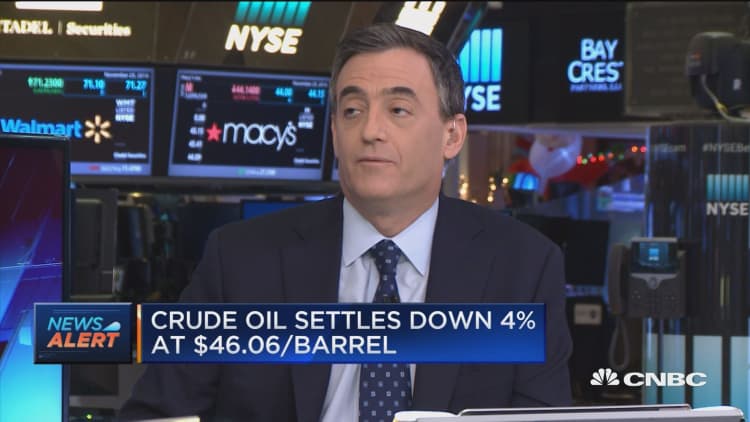
Oil prices extended losses on Friday after Reuters reported Saudi Arabia will not attend a meeting of non-OPEC producers on Monday, where production levels are on the agenda.
The decline in prices suggests markets are disappointed by the news, but analysts were split on what the latest headline actually means for the Saudis' goal of of getting other oil-producing countries to cut production.
Monday's meeting was to discuss the contribution that producers outside the Organization of the Petroleum Exporting Countries will make to a supply-limiting agreement. OPEC oil ministers meet on Wednesday to finalize a deal agreed to in September to limit output among cartel members themselves.
OPEC sources said Saudi Arabia was not attending the Monday meeting because it wants to focus on reaching consensus within the organization first. The group is still attempting to overcome objections from Iraq and Iran, which have asked to be exempt from production cuts.
Deal comes crashing down?
John Kilduff, founding partner at energy hedge fund Again Capital, said he views the news as "a tremendously bearish development." Monday's meeting was supposed to seal the deal on non-OPEC producers' commitment to production limits, according to Kilduff, who has long been skeptical that OPEC can get a deal done.
OPEC has "played a nice game. They've been able to keep the market supported to a degree with their rhetoric. It looks like it's all going to come crashing down," Kilduff said.
It is possible the Saudis are not attending the meeting because they don't believe non-OPEC members will put significant production cuts on the table, said Andy Lipow, president of Lipow Oil Associates.
"It can't be positive, because otherwise you'd show up," he told CNBC.
He noted that Mexico, which has opened its oil and gas industry to foreign investment, is aiming to increase its production, while Azerbaijan needs to keep oil revenue rolling in. The best OPEC can hope from top oil producer Russia is a freeze production levels, rather than a cut, he added.
Some analysts worry a freeze and planned cuts will not be sufficient to boost prices, following a fierce battle for market share that has sent OPEC and Russian production soaring.
"The bottom line is they've yet to come to a deal in spite of all their optimistic pronouncements, and the heavy lifting is going to have to be done by Saudi Arabia," Lipow said.
Some think Saudis still want a deal
However, Barclays Head of Energy Commodities Research Michael Cohen said he does not believe it's newsworthy that the Saudis are not attending the non-OPEC meeting. The view has long been that Russia would not commit to anything more than a freeze at this December's levels, and even that is dependent on an OPEC agreement, he said.
"I still am of the view there will be a face-saving measure. They'll put together a cut that (makes official) what they were going to do anyway," he said.
Cohen said he expects the Saudis could agree to cut about 500,000 barrels a day, and the United Arab Emirates and Kuwait about 100,000 each, or 200,000 at most. But he said it will not be clear whether they meet those goals for several months, until the production data is reported.
Despite Friday's headline, nothing indicates the Saudis aren't committed to getting a deal done, said RBC Capital Markets Global Head of Commodity Strategy Helima Croft.
"But given that there still remains such residual skepticism about a deal, investors will seize on any headline as a sign things will fall apart next week in Vienna," she told CNBC.
— Reuters contributed to this story.



